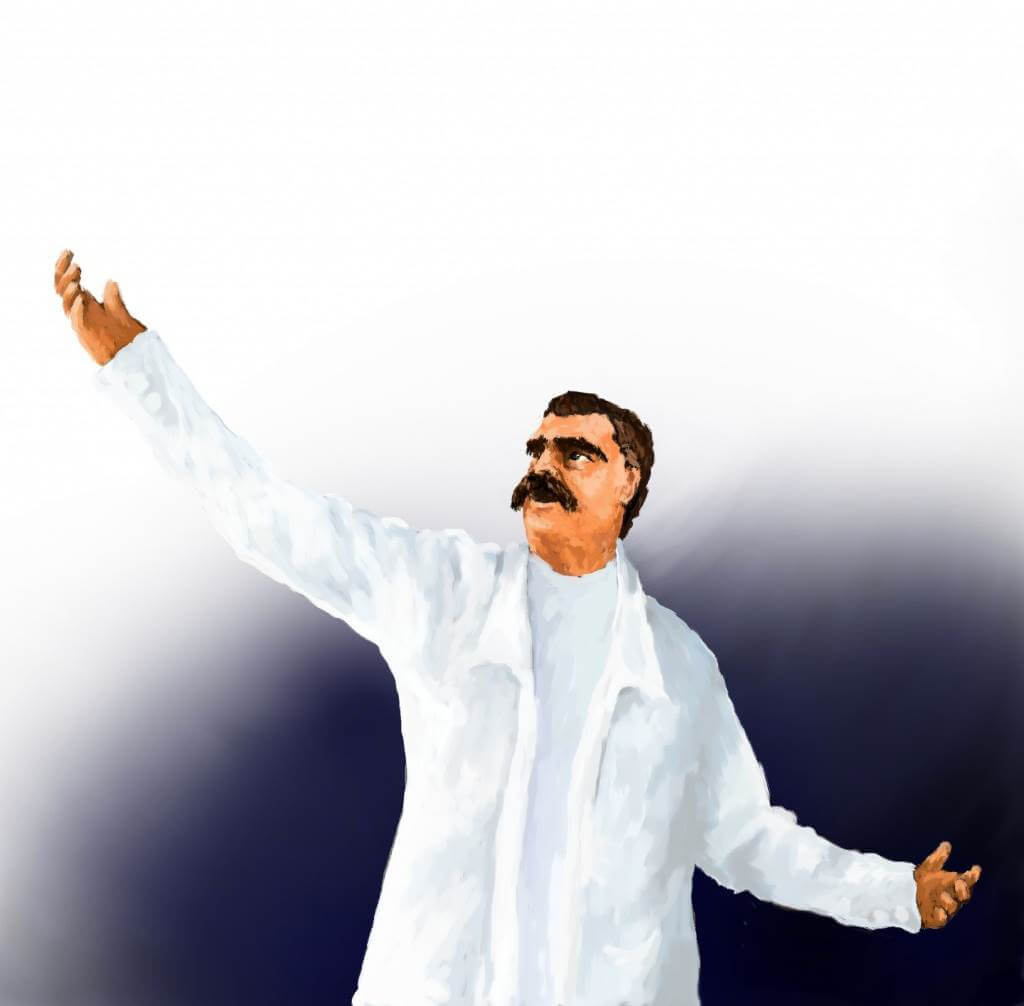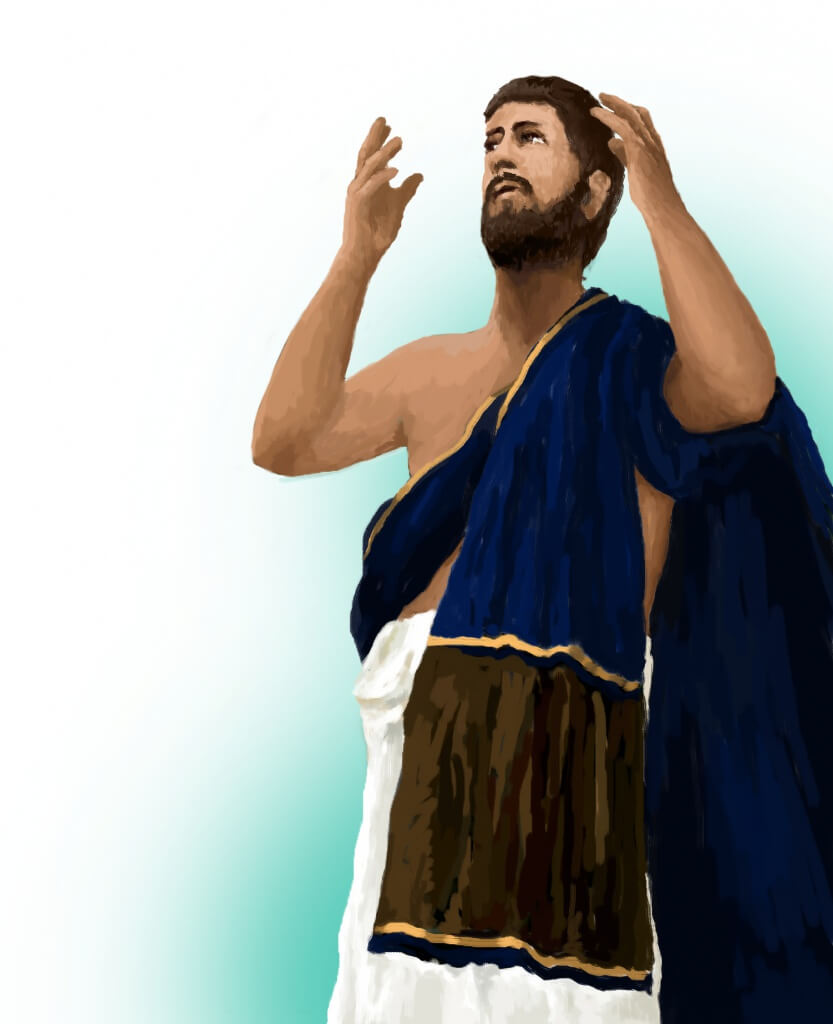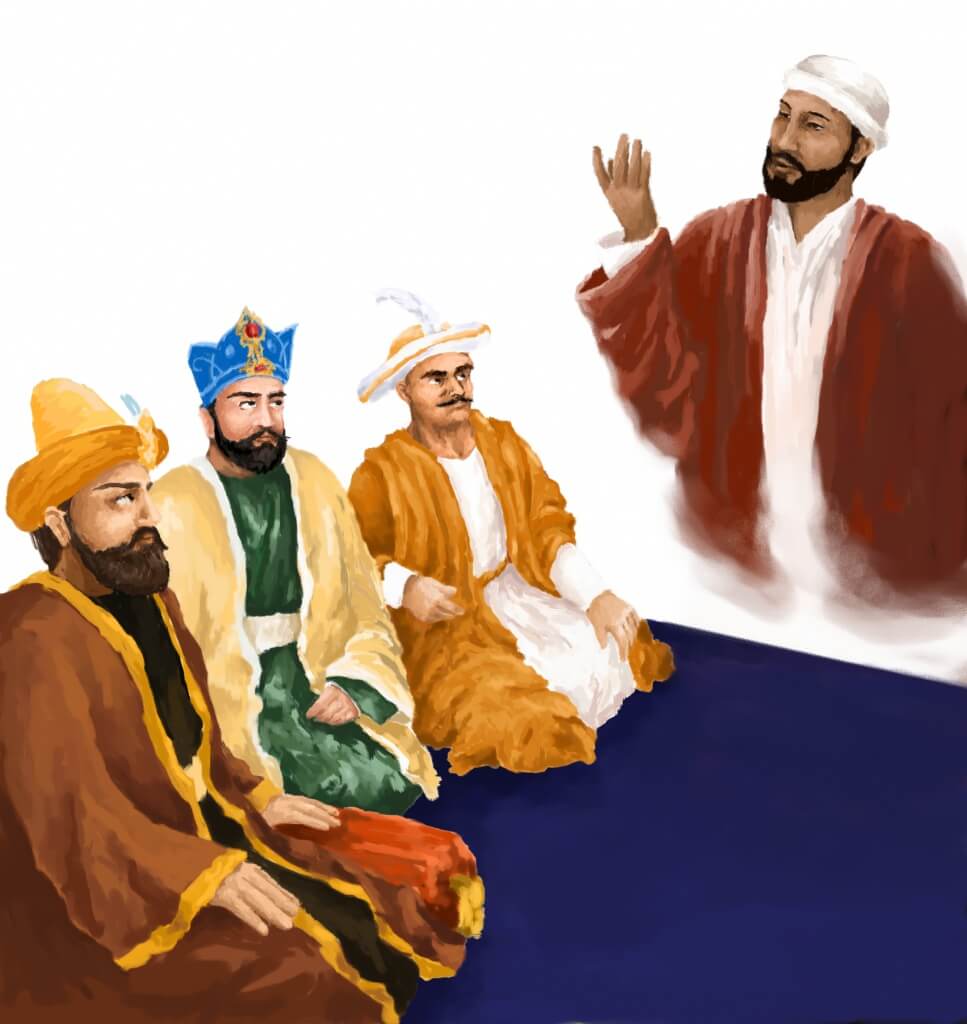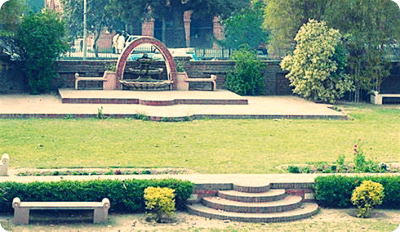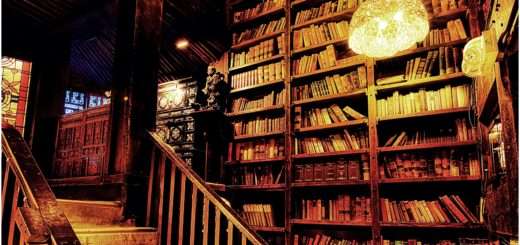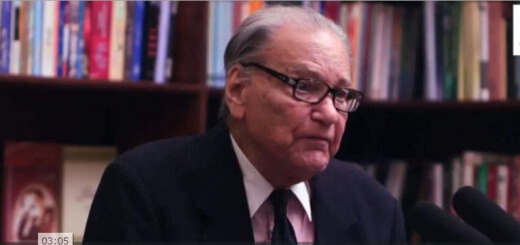Chapter 7. Beyond the skies: Javid Nama by Allama Iqbal
Chapter 7. Beyond the skies: Javid Nama by Allama Iqbal
The Paradise
I kept moving on until I reached the farthest corner of the universe. Everywhere I saw life triumphing over death and experienced different speeds of time. A year of our worldly time would pass like a month at one place and like a flash of a moment at another. I saw that different laws of nature governed each world.
At the farthest end of the universe I saw a man whose voice was filled with tragedy. His eyes were sharper than a hawk while his face radiant with the fire in his breast and on his lips was this song:
Neither Gabriel nor paradise
Nor heaven’s damsel nor for God I cry:
I crave a mould of dust that is consumed
By a yearning soul.
Rumi told me that this was the German philosopher Nietzsche who revealed the secrets of the Western civilization and was treated like a madman. Hallaj was crucified but this modern mystic while saving his life from the hands of the clergy forfeited it to the physicians who killed him with sedatives. “His station is between the two worlds,” Rumi told me.
I stepped beyond and set my foot on the world that has no dimensions and lies outside the space. I cannot describe it. Just as a bird cannot fly in a cage, the reality of that world cannot be contained in words. You can understand it if you consider the reality of your heart. You cannot measure the distance between your feelings and yet they all exist. In the same manner, that other world also exists without left and right, or day and night. You imagine something there and immediately you find it present before your eyes. The buds blossom there with the breath of the angels.
“O prisoner of though!” Rumi addressed me, “Step outside the world of your senses. The palaces you see around you are not made of bricks and cement but of good deeds.”
An exceptionally beautiful palace there belonged to one Sharfunisa, as Rumi told me. She was a noble maiden from Punjab who kept a sword by her side while reading the Quran and ordered the two to be placed on her grave when she died. “The word of truth, and the power to protect it,” Rumi said to me, “These are indeed blessings.” Both were taken away from her grave when Punjab slipped from the hands of the Muslims.
I started missing my friends on the mention of my province. Just then I heard a voice from the banks of the Kausur, the venerated stream of Paradise. Someone was singing in a beautiful voice:
Of straw I searched
A handful just to burn myself; the rose
Suspected I shall build with it my nest.
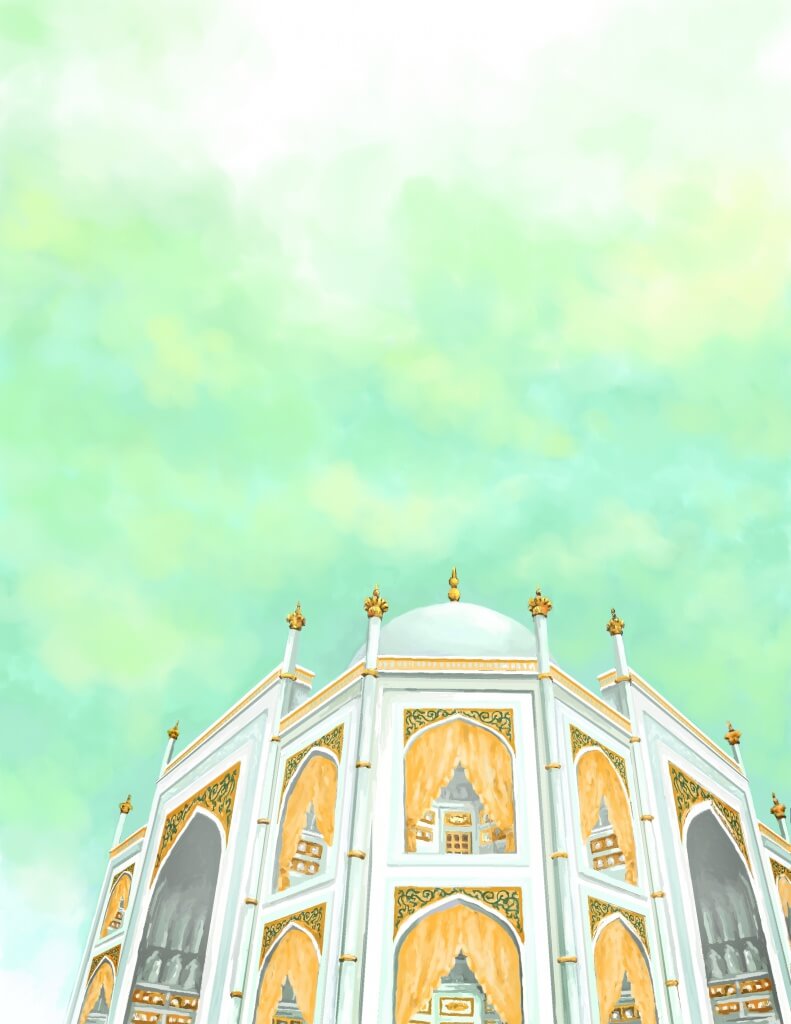
This was the famous poet from Kashmir, Ghani, sitting here in the company of Mir Syed Ali Hamadani, the saint who turned Kashmir into a little Persia. Rumi beckoned me to ask a few questions to the enlightened saint, and I the first question I asked him was about good and evil. “Why did God create Satan while he wanted us to stay away from evil?” I asked. The saint replied, “The human soul finds strength by refuting the temptations of Satan.”
I then asked him about the fate of Kashmir. The people of that unhappy valley had suffered from oppression for a very long time and their miseries had increased ever since the British sold the valley and its inhabitants to a Hindu Rajah for seven and a half million rupees (which amounted to less than ten rupees per person!). While I was talking about the woes of the people of Kashmir I saw a man in frenzy appearing all of a sudden and singing a sad song. This was the same Ghani of Kashmir whom I had heard a while ago. Now he was singing:
O breeze! If thou dost pass
By Geneva sometime,
To League of Nations take
This sad and gloomy rhyme.
Each rill, each garden, field
Each farmer too they sold,
A nation for a price
That makes my blood ice-cold.
Syed Ali Hamdani now turned to me and said, “Son! Let me tell you a secret. An enlightened person distinguishes between dust and soul. Such a person is willing to die for the sake of the Truth, for such death is but a gateway to another life.”
I asked him about the secrets of government and he told me that government could only be earned by the virtue of power. Ghani the poet now spoke again to point out that Nehrus – Motilal and his son Jawaharlal – who are struggling for the freedom of India have also descended from Kashmiri stock. A land that produces freedom lovers cannot be held in chains for long. I was then asked to recite some song of my own and I offered the following:
“Does not this world of ours
Suit thee?” He asked one day,
I said, “It never did,”
“Then break it up We say!”
If reason be thy guide
Throw it from self away,
Drink from the cup of love
With men who know the way.
These scarlet tears of mine
Out of my heart are born,
Pick up these rubies bright
Thy ring with them adorn.
The kings and the houris
Beautiful maidens of heaven were looking at me from every nook and corner of palaces that surrounded us in Paradise. These were the houris and my song had captivated them. Rumi smiled at me and said, “O Indian magician! Look at the fellow poet from India who has been moved by your song.” I looked up and found that Bhartari Hari, the great Hindu poet had come out of his heavenly abode. Rumi and I rose in his honor and I had an interview with Bhartari. Above all I wanted to know whether the essence of a powerful verse came from God or from the poets themselves.
“Nobody knows where is the place of a poet,” Bhartari said to me, “A poet lives in the ups and downs of the notes of a song.”
I then asked him to reveal the truth about God, since this was a time when the people of his homeland needed it most. Bhartari sang one of his songs in response to my question:
All sapless are thy prayers
Bereft of action’s fire,
For actions, good or bad,
Do shape this life entire.
The world thou seest is not
The handicraft of the Lord,
From thee alone emerge
The spinning wheel, the cord.
Before the law of actions
Bow, from the rest be free,
They are deed’s reflections
Hell, heaven, purgatory.
I wrote his words on my heart and then listened to Rumi who was telling me to move on. “You have seen the company of the dervishes,” he was saying, “Now look at the glory of the kings.”
We arrived upon a grand palace, more beautiful than any words can describe. It height could not be measured and it was all made of moonstone, so that it seemed to be containing the skies in its lap. The breeze was so rejuvenating that it could turn a petal to red in no time. The flowers in the surrounding gardens were changing their colors every moment. Inside, we saw a grand court where houris with golden girdles around their waists were standing in attendance upon three kings. They were Nadir of Persia, who strived for reconciliation between the Shias and Sunnis in his empire; Ahmed Shah Abdali, the founder of Afghan nationalism; and Sultan Tipu, the martyr who died for the freedom of the East. They asked questions about their countries after Rumi had introduced me as a great poet.
We discussed the conditions of Persia, Afghanistan and India. I regretfully informed them that the people of Iran were thinking of themselves as Persian first and Muslims later while Afghanistan was wrought with dissentions and internal conflicts. India, however, was struggling against the Western colonialists. “A people cannot accept a foreign rule forever no matter how good that rule may be,” I said. While we were having our discussion the spirit of a great poet of classical Persian, Nasir Khusro appeared, sang a song and then disappeared again. His song was this:
If thou hast let the sword or pen
Be of thy hand the rider fair,
Then if thy body’s steed be lame
Or it be nimble – have no care.
Nor quill nor sword can art produce
When handled by mere faithless men,
And no intrinsic worth remains
Devoid of faith in sword or pen.
Abdali made a profound remark about the European civilization. “Their power does not lie in wine, night clubs and skimpy clothing of women,” he said, “It lies in their knowledge and enlightenment. O Youth of the East! Knowledge comes with brains, not with Western clothes.”
Tipu told me that once, when he recited my verses to the Holy Prophet in Paradise, the Prophet asked him whose verses were these and remarked that they contained the spark of life. Tipu then asked me to use that spark of life and take his message to the River Kaveri that runs past his tomb in Deccan. His message was, “O Kaveri! Slow down for a while and listen to me, for I am your sovereign who was wide-awake when the rest of the East lay in deep slumber. Don’t come to life unless you are prepared to always move on, for do you know what is the rule, religion and creed of life? It is this: to live like a lion for a moment is better than a hundred years of living like sheep. A true believer is the predator of death.”
I was deeply touched by the words of the martyr king when Rumi asked me to move on. With a grave heart I headed for the gates of that palace and found a gathering of the houris there. They were asking me to stay with them for a while. “True love doesn’t stop until it reaches the presence of God Almighty,” I said to them, “Love starts with admiration of physical beauty but it must rise above that level.”
The houris then asked me for a song, and this is what I sang to them:
What search for God will profit thee
When thou failed reaching man?
What is friend’s union for the one
From self away who ran?
Demand no flaming song from me
With which thy heart to burn;
For men to find its bleeding track
To tulip-garden turn.
A dervish I am who upon
The world doth shed new light,
Thou needst no other alchemy
Pray gain from me my sight.
God
Paradise too is a manifestation of God, however the soul of a lover cannot be satiated with anything but the sight of the beloved and hence I moved beyond those palaces and the houris. Knowledge impure in nature becomes an impediment to vision but knowledge aimed at the vision of beauty is the path as well as the guide. It nourishes your heart and your sight through interpretation of the universe and leads you to the doorstep of God. There, however, you stand alone – without your knowledge or any other attachments, because a lover’s jealousy would not suffer the company of a third entity in the presence of the beloved.
I allowed my soul to drift in the ocean of light and was engrossed in looking at God in His Infinite Beauty present in ever changing glories. I became lost in the secrets of creation and life appeared to me like a harp, each string an instrument in itself and each note more piercing than the other. All creations belonged to the same family of light and fire. A mirror was placed in front of my soul and my sense of wonder was mingled with my faith.
There I saw the past and the future standing together before a present morning. God was before me with all His mysteries and looking at Himself through my eyes!
“O Creator!” Love made me bold and I ventured to address the Almighty, “Does this world suite you where humans are preyed upon by the profiteers, tyrants, maulvis and false saints? Indeed, a world of miseries doesn’t suite a creator like you, O Lord! It is a stain upon your name!”
“The pen of destiny wrote whatever We chose from the good and the bad,” God answered me, “Do you know the meaning of life? To live means to create through Our power. Make your own world if you are alive, for whoever lacks the power to create is indeed an infidel in Our eyes.”
“Nations don’t resurrect once they die,” I said, “Just as the water doesn’t turn back in a running stream.”
“Life doesn’t depend on the physical reality alone,” God answered me again, “Since I have said that I am closer to you than your jugular vein, you too can become immortal by the virtue of this closeness. A nation can also become immortal through Unity, just like an individual. O you who say ‘There is no god except Allah,’ do you understand the meaning of a nation? A nation is like thousands of eyes seeing together. Attain this unity of vision, so that you may possess authority in the world.”
“O Lord! Pray tell me who am I, and what is your reality?” I asked, “Why am I far away from you? Why am I subordinate to destiny? Why do I die and how are you immortal?”
God answered all these questions in one statement. “Whoever lives in the world, dies in it,” He said, “Live within yourself and absorb the world too if you want to become immortal. Then you will know who are you, and who am I, and how do you live and die!”
“Forgive me my Lord,” I ventured a little more, “But I pray you to reveal the fate of the world upon me! I have seen the revolutions of Germany and Russia, and I have seen the anxiety in the hearts of the Muslims. I know the schemes of the East and the West, let me see their destinies too!”
Suddenly I saw my planet and its sky bathed in a scarlet light. The visions revealed all realities on my soul and I could not hold my power of speech anymore. Like Moses I fell unconscious. A deep, passionate voice arose from the inner reaches of that dimensionless world. It was singing this song:
Be not enchanted by the West
Nor on the East thou needest dote,
For both this ancient and this new
Together are not worth an oat.
So carelessly to Ahriman
The precious jewel thou didst sell,
Was such that cannot well be pledged
With even trusty Gabriel.
Than radiant sun that illuminates
The ancient sky thou art more bright,
So live that every grain of sand
May borrow brilliance from thy light.
Continue to Epilogue: Advice to Javid and Posterity
Republished with permission and compliments of Khurram Ali Shafique, Editor Javidnama [Junior Edition Series] and Iqbal Cyber Library.

